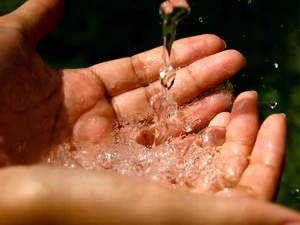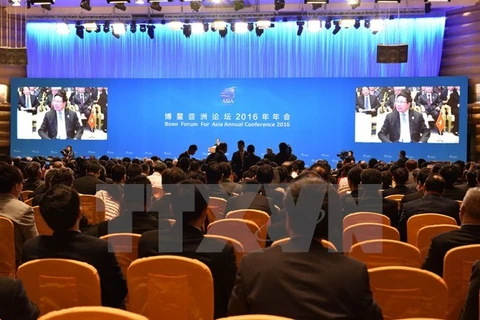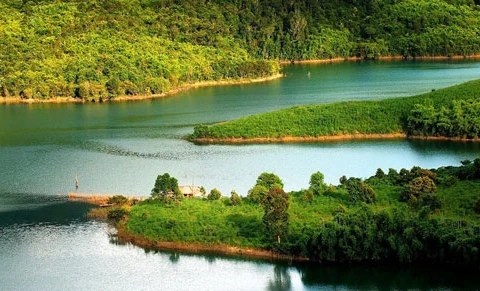Hanoi (VNA) – Experts gathered at a workshop in Hanoi on December 14 to seek measures to enhance water resources security amid climate change and energy development in the Mekong Delta region.
According to Nguy Thi Khanh, Director of Green ID under the Vietnam Union of Science and Technology Associations (VUSTA) - organiser of the workshop, the Mekong Delta is facing numerous challenges in ensuring water resources security and sustainable development.
Climate change and rising sea water level are taking place quicker than forecast, resulting in many extremist weather patterns that affect the livelihoods of local residents, she said.
Well-meant but misguided climate change interventions in the Mekong Delta are set to do more harm than good, and only a change in policymakers’ mindset can reverse the damage, said Nguyen Huu Thien, an independent researcher and expert, said.
The change in mindset would involve a shift from forceful interventions to embracing natural cycles, he said.
Thien, whose work focuses on the Mekong Delta’s ecology, was giving his assessment of Resolution No 120 on sustainable development for the Mekong Delta that Prime Minister Nguyen Xuan Phuc signed in November.
The biggest problem is serious degradation of surface water quality caused by a series of ill-planned sluices, he noted.
In dealing with the serious threat to crops posed by worsening saline intrusion, authorities have built systems of floodgates to prevent seawater intrusion into rivers and canals, as also land being “eaten away” by the rising sea, he added.
However, without normal ‘water exchange’ between rivers and the sea, river flow is affected; they become stagnant and pollutants - some 2-3 million tonnes of fertiliser and 100,000 tonnes of insecticides or growth stimulants from agriculture apart from domestic and industrial waste – keeps building in the still waters. The practice thus far has been to open the sluice gates only when the pollution and water quality has reached unbearable levels.
So, in the “the country of rivers and water,” when surface water became unfit for consumption, Mekong Delta residents have been forced to dig deep for groundwater.
Thien highlighted the irony of this situation by referring to Samuel Taylor Coleridge’s famous quote: “Water, water everywhere, nor a drop to drink.”
The irony gets deeper in the Mekong Delta. With some one million plus wells drawing up groundwater in the region, land subsidence has been occurring at the rate of 1.6cm per year. If groundwater exploitation continues at this rate, by 2050, the entire Mekong Delta would sink 0.88m compared to the 1990s, a result 10 times worse than the subsidence caused by rising sea level, Thien warned.
In this context, Resolution No 120 has brought some clear-mindedness and a good strategy that Thien felt could “steer the delta towards in a sound direction,” by not considering flooding or saltwater as mortal enemies, and seeing both fresh water and brackish water as important resources to harness.
If the spirit of the resolution is followed faithfully, the “self-purification” capability of the Mekong River system can be restored, surface water becomes usable again, and the need for groundwater reduced, leading to a deceleration of subsidence.
Thien also praised the resolution for doing away with ‘triple cropping,’ switching priority from maximising output to maximising the value-added component in the value chain.
International experts have for long pointed out the close interconnectivity between water, food and energy security. An exponentially growing population demands increasingly large amounts of food, but current popular agriculture models are both water-intensive and energy-intensive, which drive up exploitation of fossil fuels and water, leading to adverse climate impacts and a fall in crop output.
The Mekong Delta needs comprehensive master planning that reduces the water-food-energy conflicts, said Le Anh Tuan, Deputy Director of the Climate Change Institute under the Can Tho University.
Tuấn urged the Government to rethink its electricity planning – reducing the proportion of coal power, stopping the construction of new coal power plants, and prioritising renewable energy – especially solar energy, an abundant resource in the southern region.
As the nation’s hydropower potentials are exhausted, the Government is envisioning 14 coal power plants to be built in the Mekong Delta region by 2030, with the majority of coal being imported. The move has been criticised severely by many energy experts and environment activists who consider this an extreme, backward step that goes against global “greening” trends.
Other workshop participants raised the impacts of hydropower plants and other water exploitation projects on upstream stretches of the Mekong River in China, Thailand, Cambodia and Laos.
They noted that in the past, the erosion rate trailed the rate of sediment deposits. However, as most of the sand and a large part of alluvium in the Mekong River are now blocked by the dams, the Mekong Delta is starved of the regular replenishment of its soil that used to happen during the annual flooding season.
Now, the erosion rate has “for the first time in 6000 years, surpassed the deposition rate,” and along with excessive sand mining, resulted in the recent rise erosion and number of landslides, Thien said.-VNA
VNA























